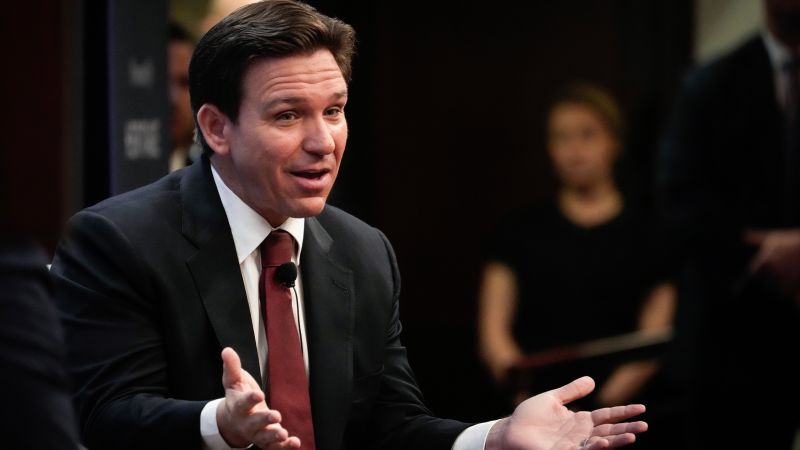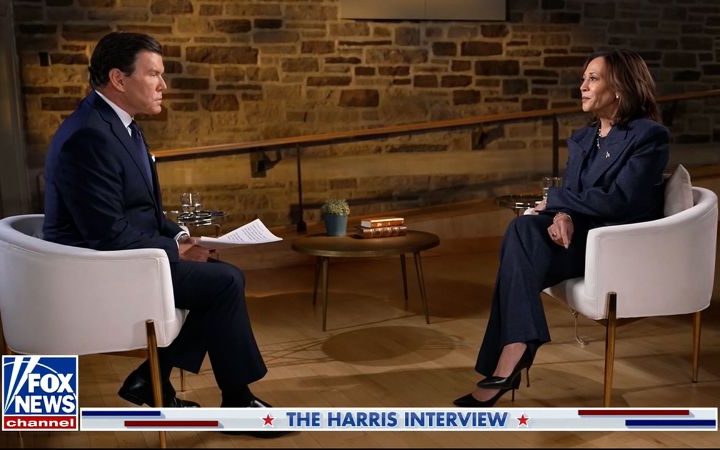Florida Gov. Ron DeSantis recently recounted blow by blow at an Iowa sports bar his takeover of a tiny liberal arts school, describing how he turned Sarasota’s New College from a “Marxist commune” with gender studies courses into a conservative vision for higher education.
“So I appointed seven conservatives to the board of trustees,” the Republican governor and 2024 White House hopeful told those gathered. “They fired the president, hired a conservative president.”
As it was, the ink was barely dry on the contract for that new president, Richard Corcoran, a former state education chief under DeSantis. The day before DeSantis’ Iowa appearance, those New College board members pushed through an agreement that could eventually pay Corcoran up to $1.3 million a year to oversee their university — a school of about 700 students.
Working on the front lines of the culture fights for DeSantis can be quite lucrative, it turns out. Many of the governor’s top lieutenants in charge of executing his hard-charging agenda — which doubles as a platform for his presidential campaign — earn six-figure incomes. In some cases, their pay far outpaces the salaries for their jobs under past Florida governors.
Dr. Joseph Ladapo, the state surgeon general who is leading DeSantis’ crusade against the coronavirus vaccine, collects about $447,000 a year through an arrangement that also includes a paid position at the University of Florida College of Medicine. That’s nearly twice as much as what his predecessor was making when he left the position, which included a salary from the college as well.
Cord Byrd, the appointed secretary of state overseeing DeSantis’ new election police force and leading his crackdown on alleged voter fraud, makes $188,000 a year, a pay bump of 32% compared with the officeholder in the previous administration.
Manny Diaz Jr., the public education commissioner who recently sparred with Florida’s only Black Republican congressman over the state’s new African American history standards, has a salary of $314,000 — about $38,000 a year more than the previous two people to hold the job, one of whom was Corcoran.
Other allies have found themselves in high-paying positions not long after delivering on contentious DeSantis priorities. Like Corcoran, they were hired by boards stacked with DeSantis appointees.
A spokesman for the governor’s office did not respond to questions about how these salary decisions are made. His campaign declined to comment, referring questions to his gubernatorial staff.
DeSantis was once a stickler for keeping executive branch pay in check. He entered politics as a tea party conservative, and his first bill after getting sworn into the US House of Representatives in 2013 sought to freeze the pay of federal employees and halt raises for senior Obama administration staff. It passed the House and died in the Senate.
But in Florida, where he has wielded the powers of the executive branch unlike any of his predecessors, DeSantis’ inner circle is well compensated. There are 59 people in his office earning more than $100,000 a year, according to an online employee salary database maintained by the state, twice as many as there were at the end of the term of his predecessor, fellow Republican and now-Sen. Rick Scott.
James Uthmeier, who was DeSantis’ chief of staff before taking a leave of absence in August to join his struggling White House bid as campaign manager, made $196,000. His salary was about $30,000 higher than what Scott’s final gubernatorial chief earned.
The paychecks of DeSantis’ appointees and allies have at times drawn criticism from Democrats in his home state as he campaigns for president on a promise to slash spending in Washington and cut federal agencies.
“Republicans are supposed to be about small government, no bloat and fiscal responsibility, but this guy likes to pad salaries like nobody’s business,” said state Sen. Jason Pizzo, a Miami Democrat. “He talks about draining the swamp and bloat in DC, but these salaries are nuts.”
In the case of Corcoran, DeSantis’ appointees on the New College board of trustees have defended the agreement.
“We aspire to be one of the top, if not the top, liberal arts institutions in the nation and that’s what we are setting as a goal and that’s what we’re going to be asking of our president,” said one board member, Tampa lawyer Ron Christaldi. “And that was the litmus test for me on how we should approach these things.”
New College’s progressive student body, shaken by the Republican overhaul there, was already skeptical about Corcoran, a deeply conservative former state House speaker who led the charge to ban critical race theory in schools as DeSantis’ first education commissioner. But his pay, once revealed, became a lightning rod of its own.
Corcoran will earn a $699,000 base salary plus several hundred thousand dollars in perks and incentives and an additional $200,000-a-year in retention payments that will be paid out if he stays at the university through February 21, 2026. His base pay is double that of his predecessor.
The base pay of the president at Florida State University, a campus of nearly 45,000 students with athletic teams perennially ranked among the best in college sports and a $300 million research budget, was recently raised to $1 million.
To justify the salary, trustees pointed to a study that showed Corcoran’s total renumeration would be in the median of salaries paid to the leaders of “peer” schools reviewed by a consultant hired by New College. However, all of the schools in that study were private universities — some religiously affiliated. They also had larger student bodies than New College, some by a factor of 10 or more.
Amy Reid, a New College professor and the faculty representative on the board of trustees, questioned whether the school could even afford Corcoran’s pay.
“This is not a competitive salary. This is an excessively generous salary,” Reid told CNN. She voted against the contract.
Florida governors yield considerable power in hiring, though state lawmakers could rein in the executive branch through the budget and the state Senate can block certain appointments. But Republicans, who control both Florida legislative chambers by wide margins, have largely acquiesced to DeSantis’ demands.
Last year, it appeared Republican state lawmakers were prepared for a rare standoff with DeSantis during the once-a-decade redrawing of the state’s congressional boundaries. In an unprecedented move, DeSantis submitted his own map — a heavily partisan redrawing of district lines that critics said illegally diluted Black voting power.
State Sen. Ray Rodrigues, the GOP leader on redistricting in the Senate, initially urged his colleagues to reject the DeSantis map. But he later changed sides, and the DeSantis plan was passed. The new districts ultimately helped congressional Republicans add four House seats in the 2022 midterms, a fact DeSantis now touts on the campaign trail. The map, though, faces significant legal headwinds and lawmakers may have to someday redraw it.
It won’t be a problem for Rodrigues to deal with, though. In September of last year, he was named chancellor of the state university system by its board of governors, a body where 14 of 17 members are appointed by DeSantis. At $420,000, Rodrigues’ salary is higher than any paid by Florida taxpayers.
Another board mostly made up of DeSantis appointees, the South Florida State College trustees, also plucked a lawmaker this year to be their institution’s next president: Fred Hawkins. The former state representative is paid $250,000 a year under his contract. Hawkins doesn’t have a background in higher education and was once charged with impersonating an officer while serving as a local county commissioner, earning him a suspension from DeSantis.
But months before his hiring, Hawkins sponsored one of the most controversial bills of DeSantis’ tenure: the legislation that stripped Disney of its special taxing authority and gave the governor authority to pick the new board to oversee the entertainment giant’s Central Florida theme parks. The bill escalated DeSantis’ feud with Disney over the company’s opposition to a Florida law that restricted the teaching of sexual orientation and gender identity in schools.
With his new power, DeSantis filled the Disney oversight board, called the Central Florida Tourism Oversight District, with Republican donors and like-minded conservatives. In May, the board picked a new administrator, Glenton Gilzean Jr., the former president of the Central Florida Urban League whom DeSantis has regularly tapped for key assignments. Gilzean, who is Black, also defended DeSantis in an earlier fight against the College Board over a proposed African American Studies Advanced Placement course.
Gilzean will make $400,000 a year in his new position — $45,000 more than the person he succeeded.
Justifying the pay bump in May, board President Martin Garcia said, “It’s a very different job description.”
Indeed, Gilzean has already taken the district in new directions. In August, he abolished diversity, equity and inclusion programs in the district — a top priority of DeSantis’ as governor and a regular talking point on the campaign trail.
Read the full article here







